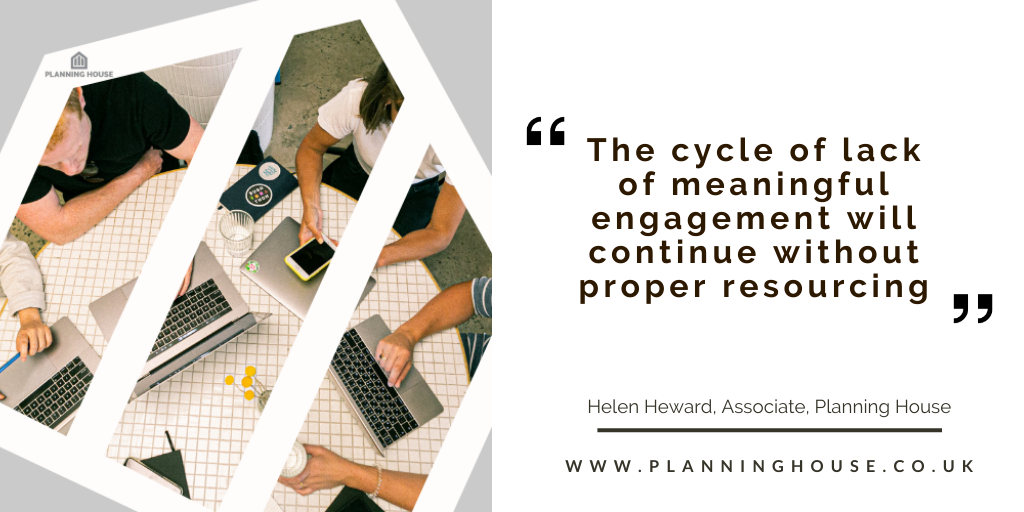At the end of a meeting with any new client regarding development potential of a site I am often faced with the question “so what’s the next step” and my response is usually one along the lines of “you COULD submit a preapplication enquiry” where I go on to list the many benefits of a pre-application submission (which I DO acknowledge) however I usually reluctantly caveat my response with “but it might not be useful in this instance”. This is usually due to market/time pressure or because I know without significant supporting information (basically what the applicant would need for a planning application) the response would be a regurgitation of policy rather than consideration of the site specific issues. I do however say “reluctantly” for a number of reasons as when done correctly by all parties pre-application submissions can be hugely useful.
When done genuinely and correctly by all involved in the planning system, pre-application engagement can be massively beneficial to all parties. For an applicant it outlines the likely issues and give opportunity to discuss with consultees and relevant experts to find solutions to address problems. It can also outline the validation requirements and give an indication of any likely developer contributions to assist in assessing the viability of their proposals. It can of course avoid unnecessary costs associated with formal submissions for developments with “show-stopping” issues. For Council Officers engaging in pre-application submissions have all the associated benefits of considering a planning application without the time pressure of statutory application determination dates. Essentially that means once an application is submitted it can be relatively straight forward and avoid the need for any Extension of Time agreements.
Pre-application engagement is something I am, and always have been a huge advocate for, it really does build a relationship with the planning officer and in my view that can only be a good thing. In my previous role as a local authority planning officer I would get frustrated by developers and applicants who did not submit pre-apps. However unfortunately I have to say now, having been in the private sector for over 2 years, I completely understand the reluctance. Having said all of this there are officers I have worked with on schemes, whilst being in the private sector who have handled pre-application submissions in a similar way to full planning applications, being genuinely engaged in the process and the outcome (regardless of positive or negative) have been useful.
Whilst acknowledging the many benefits, my experience more recently is that responses are slow, costly and honestly disappointingly basic! Often consisting of pages of local and national planning policy with very little consideration of the site specific issues of the scheme regardless of the detail submitted. In an extreme case recently, I waited for almost 6 months for an officer response on what I would consider a detailed pre-app submission. No additional information was requested over the course of the submission, that was just the time it took before receiving a response despite almost weekly emails/phone calls chasing a response which in the end began to feel awkward. When discussing this with a local authority officer it was disappointing but not unexpected to hear that “unfortunately pre-application responses are not a priority” and “timeframes for responses are aspirational rather than deadlines”. I do understand this, after all the success of planning authorities is measured wholly on the percentage of applications determined in time (or of course within the agreed extension to the “in time” period). Quite frankly I don’t think that’s good enough and it doesn’t benefit anyone. The current system isn’t set up to encourage engagement until the time pressure of the application clock is ticking by which point it almost seems too late and as a result there is a reliance on agreeing an Extension of Time.
I understand that we are all living and working in extremely different and difficult times and I do appreciate that this in some cases might mean some understandable and reasonable delays. However remote working shouldn’t result in slow or ineffective working and it doesn’t seem that people will be back in the office any time soon so something has to change. There are so many excellent examples of planning responding to the ‘new world of working’ but in my experience it hasn’t yet trickled down to pre-application engagement despite the fact that, in my opinion, pre-application engagement can assist in achieving the holy grail of “streamlining the planning system” that countless planning reforms have strived for.
In my opinion there is a sense of disillusionment with pre-application submissions from both sides of the table. Developers/applicants often consider it a waste of time and money and often engage too-late seeing it as a requisite step prior to submission. However, I can also understand officer frustration as a result of this approach. Similar to other opinion pieces I have previously written, unfortunately, I think this comes down to the lack of resources for local planning authorities. Until the planning system puts genuine emphasis on engagement and considers this a measure of success alongside properly resourcing planning departments I’m not sure much will change and so the cycle of lack of meaningful engagement will continue.
Related Content:
The relationship you have with the planning officer dealing with your proposal is important, take a look at our blog on Making an Ally of your Planning Officer.
Take a look at another blog in which Helen shares her views about Extensions of Time and if there use if being abused by Local Authorities.
Our eBook on the Application Process has details on the planning process, however if you need assistance then don’t hesitate to Contact Us.
The Government encourage pre-application engagement and have provided Guidance on how they believe it should be carried out.


